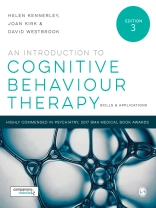This bestselling guide to the basic theory, skills and applications of cognitive behaviour therapy is fully updated to reflect recent developments in CBT theory. It includes in-depth material on working with diversity, and new case studies and exercises to help you reflect and explore how theory can be used to develop effective practice.
The Companion Website features over 40 videos illustrating the CBT skills and strategies discussed in the book, including:
- Measuring CBT’s effectiveness
- Socratic method and applications
- Physical techniques and behavioural experiments
- Applications of CBT to specific client disorders
- Using supervision in CBT.
Table of Content
1. Basic Theory, Development and Current Status of CBT
2. Distinctive Characteristics of CBT
3. The Therapeutic Relationship
4. Assessment and Formulation
5. Measurement of CBT
6. Helping Clients Become their Own Therapists
7. Socratic Methods
8. Cognitive Techniques
9. Behavioural Experiments
10. Physical Techniques
11. The Course of Therapy
12. Depression
13. Anxiety Disorders
14. Anxiety Disorders: Specific Models and Treatment Protocols
15. Wider Applications of CBT
16. Alternative Methods of Delivery
17. Developments in CBT
18. Evaluating CBT Practice
19. Using Supervision in CBT
About the author
Helen Kennerley, D.Phil, is a Consultant Clinical Psychologist and founding fellow of the Oxford Cognitive Therapy Centre (OCTC), where she was for many years Director of the postgraduate courses in Advanced Cognitive Therapy Studies and the MSc in Cognitive Behavioural Therapy. She is currently the lead for the OCTC / University of Oxford Postgraduate Certificates in Supervision and Training and in Psychological Trauma. She is also a Consultant Clinical Psychologist with the M.O.D. She has made valuable contributions to the field of cognitive therapy through her popular workshops and her writings. Amongst other publications, she is the author of Overcoming Anxiety and co-author of An Introduction to Cognitive Behaviour Therapy, both of which have been highly commended by the British Medical Association. In 2002, Helen was also voted one of the most influential female cognitive therapists in Britain by BABCP members.












